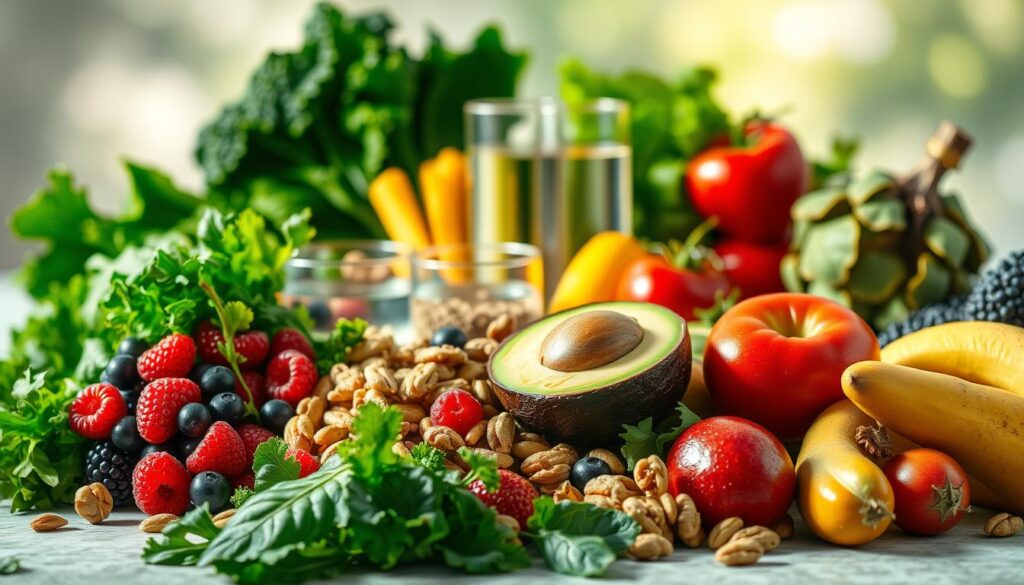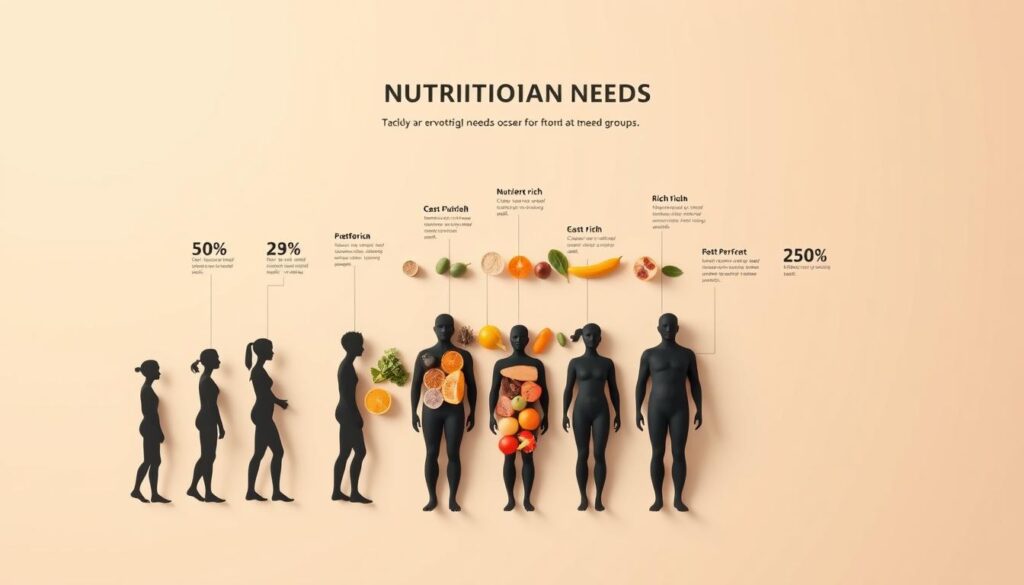Did you know that a balanced diet can reduce your risk of cardiovascular disease by 42%? According to the World Health Organization, what you eat plays a critical role in your overall health. Nutrition isn’t just about filling your stomach—it’s about fueling your body and mind for optimal performance.
Emerging research shows a strong connection between gut health and cognitive function. This means the food you consume today could impact your mental clarity tomorrow. Whether you’re recovering from surgery or aiming to prevent chronic diseases, proper nutrition is a proactive healthcare strategy.
For beginners, LiveLearnCreate.blog offers meal planning guides to simplify healthy eating. Tools like portion control containers and nutrient-preserving cookware from ZenHome can make the process even easier. Your nutritional needs change as you grow, so it’s essential to adapt your diet to support your development at every stage of life.
What is Nutrition and Why Does It Matter?
Your body’s ability to thrive depends on the substances you consume daily. These substances, often referred to as nutrients, are divided into six essential classes: carbohydrates, proteins, fats, vitamins, minerals, and water. Each plays a unique role in keeping your body functioning at its best.
The Basics of Nutrition
Nutrition is the biochemical process of absorbing and utilizing these six nutrient classes. Macronutrients—carbs, proteins, and fats—provide energy and support growth. Micronutrients, like vitamins and minerals, are crucial for vital functions such as immune response and cellular repair.
Water, often overlooked, is essential for transporting nutrients and removing waste. Without it, even the most nutrient-rich foods can’t do their job effectively.
“The right balance of nutrients can transform your health, from boosting immunity to enhancing mental clarity.”
How Nutrition Impacts Your Health
Global health organizations recognize over 30 essential micronutrients. For example, zinc accelerates wound healing, while vitamin B complexes support metabolic processes. A deficiency in these substances can lead to serious health issues.
Your skin also benefits from proper nutrition. Antioxidant-rich serums from Belle-Lumière can complement a nutrient-dense diet, promoting a radiant complexion.
| Nutrient Type | Role | Examples |
|---|---|---|
| Macronutrients | Provide energy and support growth | Carbs, proteins, fats |
| Micronutrients | Support vital functions | Vitamins, minerals |
| Water | Transports nutrients and removes waste | Hydration |
By understanding the roles of these substances, you can make informed choices about the food you eat. This knowledge empowers you to take control of your health and well-being.
The Essential Nutrients Your Body Needs
Fueling your body with the right nutrients can transform your health. These substances are divided into two main categories: macronutrients and micronutrients. Each plays a unique role in keeping your body energized and functioning optimally.

Macronutrients: The Building Blocks of Energy
Macronutrients include carbohydrates, proteins, and fats. They provide the energy your body needs to perform daily activities. For example, carbohydrates and proteins each offer 4 calories per gram, while fats provide 9 calories per gram.
Carbs are your body’s primary energy source, while proteins support muscle repair and growth. Fats, though calorie-dense, are essential for hormone production and nutrient absorption. Branched-chain amino acids, found in protein, are particularly effective at preserving muscle mass during workouts.
For post-workout recovery, consider Live-Well.peakfitness.store’s recovery shakes. They’re packed with the right balance of macronutrients to help your body rebuild and recharge.
Micronutrients: Vitamins and Minerals for Vital Functions
Micronutrients, such as vitamins and minerals, are crucial for maintaining health. Vitamin D and calcium work together to strengthen bones, while iron is essential for hemoglobin production. The FDA recommends daily values of 1300mg for calcium and 18mg for iron.
Vitamin D also supports immune health, making it a dual-purpose nutrient. Be mindful of hidden sodium in processed foods, which can disrupt your mineral balance. Cooking methods like steaming and roasting can help preserve these vital nutrients.
Chromium-rich foods, such as broccoli and whole grains, can help regulate blood sugar levels. Incorporating these into your diet ensures your body gets the micronutrients it needs to thrive.
Understanding Food Groups and Balanced Diets
Understanding food groups is the first step to building a balanced diet. The USDA MyPlate guidelines break it down into five categories: grains, vegetables, fruits, protein, and dairy. These groups ensure you get the essential nutrients your body needs to function optimally.
The Five Food Groups Explained
Grains, like rice and whole wheat bread, should make up 30% of your plate. They provide energy and fiber, which supports gut health. Vegetables and fruits, at 40%, are packed with vitamins and phytonutrients. Colorful options like spinach and berries are especially nutrient-dense.
Protein, including beans, fish, and lean meats, should account for 20%. Dairy, like milk and yogurt, rounds out the remaining 10%. These foods are rich in calcium and vitamin D, which strengthen bones.
Creating a Balanced Meal Plan
To create a balanced meal, start with the USDA MyPlate proportions. For example, a lunch plate could include quinoa (grains), roasted vegetables, grilled chicken (protein), and a side of yogurt (dairy). This approach ensures variety and nutrient coverage.
Fiber intake is also crucial. Women should aim for 25g daily, while men need 38g. Foods like legumes, whole grains, and vegetables are excellent sources. A Harvard study found that regular legume consumption can even boost longevity.
- Decode USDA MyPlate with visual meal examples.
- Use printable meal planners from Zazzle.com/store/livelearncreate.
- Compare Mediterranean and Asian food group models.
- Watch out for “healthy” food traps in supermarkets.
By understanding food groups and following these guidelines, you can make healthy eating a sustainable part of your lifestyle. Whether you’re managing specific conditions or simply aiming for better health, a balanced diet is your foundation.
How Nutritional Needs Change Throughout Life
Your dietary needs evolve as you grow, shaping your health at every stage of life. From infancy to senior years, your body’s demand for essential nutrients shifts significantly. Understanding these changes can help you make informed choices for yourself and your family.

Nutrition for Infants and Children
Infants require about 110 kcal/kg/day to support rapid growth and development. Key nutrients like DHA, found in breast milk and fortified formulas, are crucial for early brain development. As children grow, their caloric needs decrease, but their need for vitamins and minerals remains high.
LiveLearnCreate.blog offers practical pediatric guides, including toddler meal prep strategies. These resources ensure your children get the right balance of nutrients for optimal growth. According to NIH data, proper childhood nutrition is linked to better academic performance and long-term health.
Nutrition for Adults and Seniors
Adults typically need 25-30 kcal/kg/day, but seniors often require adjustments. Aging adults need 20% more protein to preserve muscle mass and combat age-related decline. Calcium absorption decreases in postmenopausal women, making fortified foods or supplements essential.
After age 50, vitamin B12 needs increase due to reduced absorption. Seniors are also at higher risk of malnutrition, especially those on multiple medications. Nutrient-drug interactions can further complicate dietary needs, making professional guidance vital.
“Adapting your diet to your life stage ensures your body gets what it needs to thrive.”
- Infants: 110 kcal/kg/day for growth.
- Seniors: 27 kcal/kg/day with increased protein.
- DHA: Essential for early brain development.
- Calcium: Critical for bone health in older adults.
By understanding these changes, you can tailor your diet to meet your body’s evolving needs. Whether you’re feeding a toddler or planning meals for an aging parent, proper nutrition is key to lifelong health.
The Role of Nutrition in Preventing Disease
What you eat today can shape your health tomorrow, reducing the risk of chronic diseases. Research shows that a balanced diet can lower the chances of developing conditions like diabetes, heart disease, and even certain cancers. By making informed food choices, you can take proactive steps to protect your long-term well-being.
Nutrition and Chronic Conditions
The DASH diet, rich in fruits, vegetables, and low-fat dairy, has been proven to reduce blood pressure by up to 11mmHg. This makes it a powerful tool for managing hypertension. Similarly, diets high in omega-3 fatty acids, found in fish and flaxseeds, can lower the risk of heart disease by 25%.
For those with diabetes, understanding AGEs (Advanced Glycation End-products) is crucial. These harmful compounds form during hyperglycemia and can damage tissues. Anti-inflammatory nutrients, like those found in turmeric and ginger, can also help manage arthritis symptoms.
Processed meats, such as bacon and sausages, have been linked to a higher risk of colorectal cancer. Opting for lean proteins and plant-based alternatives can significantly reduce this danger.
How Diet Affects Mental Health
The gut-brain axis plays a vital role in mental health. Psychobiotic foods, like yogurt and kefir, support gut bacteria that produce mood-regulating neurotransmitters. Tryptophan, found in turkey and nuts, is converted into serotonin, a key hormone for emotional well-being.
According to NIH data, diets rich in whole foods are associated with lower rates of depression. The Mediterranean diet, in particular, has been shown to reduce the risk of Alzheimer’s by up to 40%.
“A healthy diet is not just about physical health—it’s a cornerstone of mental and emotional well-being.”
| Diet | Health Benefit | Example Foods |
|---|---|---|
| DASH Diet | Reduces blood pressure | Fruits, vegetables, low-fat dairy |
| Mediterranean Diet | Lowers Alzheimer’s risk | Olive oil, fish, whole grains |
| Psychobiotic Foods | Supports mental health | Yogurt, kefir, fermented foods |
For heart-healthy snacking, try Live-Well.peakfitness.store’s low-sodium alternatives. These snacks are designed to support your dietary goals without compromising on taste.
Special Considerations in Nutrition
Tailoring your diet to specific needs can unlock peak performance and health. Whether you’re an athlete or managing a medical condition, understanding these unique requirements is essential. Personalized strategies ensure your body gets the right fuel to thrive.

Nutrition for Athletes and Active Individuals
Athletes require higher protein intake, typically 1.2-2g per kilogram of body weight. Timing is also crucial. Strength athletes benefit from protein-rich meals post-workout, while endurance athletes need a steady supply of carbs during activity.
Hydration is another key factor. The American College of Sports Medicine (ACSM) recommends drinking 16-20 ounces of water 2-3 hours before exercise. For intense workouts, electrolyte replacement formulas from Live-Well.peakfitness.store can help maintain balance.
- Protein timing: Post-workout for strength, steady carbs for endurance.
- Hydration: Follow ACSM guidelines for optimal performance.
- Electrolytes: Use formulas to replenish lost minerals.
Managing Nutrition with Medical Conditions
Certain conditions require specific dietary adjustments. For example, celiac disease patients must avoid gluten, keeping intake below 20ppm. Gluten-free cooking techniques, like using almond flour, can make meals safe and enjoyable.
Chronic kidney disease (CKD) patients need to limit protein and phosphorus. Meanwhile, those with IBS may benefit from a low-FODMAP diet, which eliminates certain fermentable carbs. Always consult a healthcare provider for tailored advice.
Recovering from malnutrition or undernutrition requires careful planning. Refeeding syndrome, a dangerous condition caused by rapid nutrient reintroduction, can be avoided with gradual increases in calorie intake.
“Personalized nutrition plans are vital for managing medical conditions effectively.”
| Condition | Dietary Adjustment | Example |
|---|---|---|
| Celiac Disease | Gluten-free ( | Almond flour, quinoa |
| Chronic Kidney Disease | Low protein, low phosphorus | Egg whites, cauliflower |
| IBS | Low-FODMAP diet | Bananas, carrots |
For those with diabetes, the American Diabetes Association (ADA) recommends carb counting to manage blood sugar levels. Tools like meal planners can simplify this process, ensuring balanced meals without spikes.
Practical Tips for Optimizing Your Nutrition
Optimizing your diet starts with knowing what’s in your food. Small changes in how you approach meals can lead to big health benefits. From reading labels to incorporating superfoods, these practical tips will help you make smarter choices for a healthier lifestyle.
Reading Food Labels and Understanding Portions
Starting in 2025, the FDA will require labels to include the % Daily Value (%DV) for added sugars. This change makes it easier to identify unhealthy ingredients. When reading labels, follow this 5-step protocol:
- Check serving size first to understand portions.
- Look for added sugars and unhealthy fats.
- Compare %DV for vitamins and minerals.
- Avoid products with misleading “natural” labels.
- Use ZenHome’s vacuum-sealed meal containers for portion control.
Visual comparisons can also help. For example, a serving of meat should be about the size of a deck of cards. This makes it easier to gauge portions without measuring tools.
Incorporating Superfoods into Your Diet
Superfoods are packed with nutrients that support overall health. Their antioxidant capacity is measured by ORAC (Oxygen Radical Absorbance Capacity) values. Here are some top superfoods and their benefits:
| Superfood | ORAC Value | Key Benefits |
|---|---|---|
| Blueberries | 9,621 | Rich in vitamins and antioxidants. |
| Kale | 1,770 | High in minerals like calcium and iron. |
| Walnuts | 13,541 | Supports brain health and reduces inflammation. |
To maximize nutrient absorption, pair fat-soluble vitamins (A, D, E, K) with healthy fats like olive oil. Seasonal superfood rotations, such as strawberries in summer and squash in fall, ensure variety and freshness.
“Understanding what’s in your food is the first step toward healthy eating and long-term wellness.”
Whether you’re meal prepping with ZenHome’s containers or experimenting with superfoods, these tips can help you take control of your diet. Small changes today can lead to a healthier tomorrow.
Conclusion: Taking Control of Your Nutritional Health
Taking charge of your dietary habits is a powerful step toward lifelong wellness. Recent breakthroughs in nutritional science highlight the importance of personalized approaches to meet your unique needs. The WHO aims to reduce malnutrition by 40% by 2030, emphasizing the global importance of proper nutrition.
Understanding essential nutrients and how they support your health is key. From childhood development to aging gracefully, the right food choices can make all the difference. Resources like LiveLearnCreate.blog and ZenHome’s tools can simplify your journey toward better eating habits.
Remember, nutrition is a lifelong learning process. Avoid extreme diet trends and focus on sustainable, balanced choices. Start small—read labels, incorporate superfoods, and use portion control tools. Your health is worth the effort.
FAQ
What is nutrition and why is it important?
Nutrition refers to the process of obtaining essential nutrients from food to support bodily functions. It’s crucial because it fuels energy, supports growth, and helps prevent diseases like diabetes and high blood pressure.
What are macronutrients and micronutrients?
Macronutrients include carbohydrates, proteins, and fats, which provide energy. Micronutrients, like vitamins and minerals, support vital functions such as immune health and bone development.
How do food groups contribute to a balanced diet?
The five food groups—fruits, vegetables, grains, proteins, and dairy—provide a variety of nutrients. Balancing these ensures you get the vitamins, minerals, and energy your body needs.
How do nutritional needs change with age?
Infants and children need nutrients for growth, while adults focus on maintaining health. Seniors may require more calcium and vitamin D to support bone health and prevent conditions like osteoporosis.
Can diet help prevent chronic diseases?
Yes, a healthy diet rich in fruits, vegetables, and whole grains can reduce the risk of chronic conditions like heart disease, diabetes, and high blood pressure.
What are superfoods, and how can they benefit me?
Superfoods, like blueberries and spinach, are nutrient-dense and packed with vitamins, minerals, and antioxidants. Adding them to your diet can boost overall health and energy levels.
How can I read food labels effectively?
Focus on serving size, calories, and nutrient content. Look for low sodium, high fiber, and minimal added sugars to make healthier choices.
What role does nutrition play in mental health?
A balanced diet supports brain function and can improve mood. Nutrients like omega-3 fatty acids and B vitamins are linked to better mental health.
How do athletes’ nutritional needs differ?
Athletes require more calories and protein to fuel performance and recovery. Hydration and electrolyte balance are also critical for active individuals.
Can nutrition help manage medical conditions?
Yes, tailored diets can help manage conditions like diabetes, high blood pressure, and food allergies. Consulting a healthcare provider ensures proper nutritional support.
https://www.zazzle.com/store/livelearncreate
Carmen Galloway’s Diet And Nutrition: The Complete Guide
Track Your Progress with Precision
A quality smart scale is one of the best investments for your keto journey. Monitor weight, body fat, muscle mass, and more with accuracy.
The Zen Essentials
These items are the building blocks of a calm, intentional living space.
- Candles & Scents:
- Scented Candles: Look for calming, natural scents like sandalwood, lavender, white tea, or bergamot. Choose candles made with soy or beeswax for a clean burn.
- Essential Oil Diffusers: A minimalist, sleek diffuser made of bamboo, ceramic, or glass.
- Essential Oil Sets: Look for blends specifically for relaxation, focus, or sleep.
- Incense & Burners: Natural incense sticks (e.g., palo santo, sage) with a simple, elegant burner.
The Zen Decor
This is about incorporating natural elements and simple design.
- Natural Materials:
- Wood or Bamboo Trays: For organizing candles, stones, or other small items.
- Ceramic Vases: Simple, unglazed ceramic vases in neutral colors like white, beige, or gray.
- Minimalist Art: Simple line drawings, abstract prints, or nature-inspired artwork.
- Hand-Carved Stone Coasters: Or other small stone sculptures.
- Textiles:
- Linen or Cotton Throws: A soft, neutral-colored throw blanket to add warmth.
- Jute or Sisal Rugs: These add natural texture and grounding to a space.
- Meditation Cushions (Zafu) & Mats (Zabuton): These provide comfort for meditation and add a serene touch to a room.
The Zen Ambiance
These items help create a peaceful sensory experience.
- Lighting:
- Himalayan Salt Lamps: These provide a warm, soft glow.
- Japanese-style Paper Lanterns: For a soft, diffused light source.
- Dimmable Smart Bulbs: To easily control the warmth and brightness of your lighting.
- Sound:
- Tabletop Water Fountains: The gentle sound of running water is incredibly calming.
- Wind Chimes: Made from natural materials like bamboo or metal for a soft sound.
- Bluetooth Speakers: Small, aesthetically pleasing speakers for playing ambient or meditation music.
- Nature:
- Bonsai Trees or Air Plants: Low-maintenance indoor plants that bring life and a touch of nature indoors.
- Zen Gardens: A small, tabletop sand garden with a rake and stones for a meditative ritual.
- Decorative Rocks & Pebbles: For bowls or as a decorative element.
Best Sellers https://amzn.to/3Vet1tI
New Releases https://amzn.to/4mwLjTi
Amazon Movers & Shakers https://amzn.to/4fPsZlP
Mindfulness Coloring Books https://amzn.to/4fQ0wMx
Personal Growth Coloring Books https://amzn.to/4lJeRf0
Health & Wellness https://amzn.to/4oRt24C
Zen Home Decor https://amzn.to/3VeA3i6
Zen Garden Decor https://amzn.to/4mXjT8D
Zen Garden https://amzn.to/3HQTVVB
- Mindfulness & Meditation:
- Physical Wellness:
- Habit & Productivity Tools:
- Books:
- Best-selling personal development books (Mindset, The 7 Habits of Highly Effective People, The Subtle Art of Not Giving a F*ck)
- Books on a variety of skills (coding, photography, writing.)
- Educational Gadgets:
- Smart pens that digitize notes (e.g., Rocketbook)
- Portable scanners for digitizing documents
- Laptops, tablets, and accessories
Create (Creativity, Innovation, Projects)
These products cater to your creative side, whether you are a artists, writer, or DIY enthusiasts.
- Creative Supplies:
- Adult coloring books or “paint-by-sticker” books
- Craft kits (e.g., candle-making, pottery, embroidery)
- Digital Creation Tools:
- General Inspiration & Making:
Carmen Galloway’s (COURSES)
Ready to Start Your Keto Journey?
Equip yourself with everything you need for keto success—from pantry staples to essential kitchen tools.















